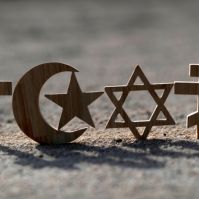It is a commonly known fact that Superman is a symbol of "Truth, Justice, and the American Way", but to many Jewish Americans he represents something much, much more. As discussed in several recent NPR spots (which inspired the ULC Ministries staff to write this post), there are a surprisingly amount of characteristics that link the "Man of Steel" to Judaism and Jewish people. This article discusses five ways in which Superman was both written to be and has become an icon for Jewish comic book readers.
Much of the information discussed in this post comes from the aforementioned NPR spots and an article published in the Jewish Virtual Library, which can be found here.
For many young Jewish Americans, Superman is much more than the "Man of Steel".
- His Kryptonian name means "Voice of God" in Hebrew
Superman's birth name, "Kal-El", can be translated to "Voice of God" in Hebrew. This fact has had a profound impact on Yiddish readers, many of whom come to see the super human extraterrestrial as something more than a mere superhero - someone that is literally divine. The impact of Superman's birth name is compounded by the fact that the suffix "-El" ("of God") is commonly associated with angels which, in Judaism, are flying, humanlike creatures with superhuman abilities.
- Events in his childhood are similar to those experienced by Moses
An integral part of Superman / Clark Kent's backstory is his infantile exodus from his home planet of Krypton. The young Superman's birth parents, father Jor-El and mother Lara, pack him into a spaceship and send him rocketing into the black void of space moments before Krypton is destroyed. He lands on a strange and foreign world, Earth, and is adopted by natives that, due to the nature of his birth, he has very little in common with.
This mirrors the Biblical story of the birth and upbringing of Moses, who is by far one of the most important figures in Judaism. Moses, the story goes, was born to an Israelite mother living in Egypt who, due to a decree by the Egyptian pharaoh that called for the execution of all first-born male Hebrew children, sent her son adrift in a basket in the Nile river. The basket was then found by none other than the daughter of the Pharaoh himself, who then adopted Moses as her own.
The similarities between the two characters are abundantly clear: Moses / Superman forced to undergo an exodus from their people (Hebrews / Kryptonians) due to the threats against their lives, and then get adopted by people who are very different from themselves (Egyptian royalty / rural Kansans). It is no small wonder that young Jews look up to a superhero that is so much like one of Judaism's most influential figures.
- The writer and artist who created Superman were Jewish
The creators of Superman, writer Jerry Siegel and artist Joe Shuster, were both born into Jewish families that emigrated to North America from Europe (Lithuania for the former and the Netherlands and Ukraine for the latter) in the early 20th century. Their Jewish backgrounds played a large role in the development of the superhero. Originally written as a villain, Siegel and Shuster reimagined the Man of Steel after the unabashedly anti-Semetic Adolf Hitler was elected as chancellor of Germany in 1933. Hitler, as part of his eugenics program, distorted Nietzsche's "superman" concept to fit the Aryan image he was ardently pushing on the German people and Siegel and Shuster decided that their Superman should be a Jewish-inspired force for good instead. This re imagination served as the template for the character we now know as Superman.
- He feels like a stranger in a foreign land
As discussed above, Superman's creators were part of a generation of American children who were born to and raised by recent immigrants from Europe. People like Siegel and Shuster frequently felt like outsiders in their own county, as the language and customs found in their homes were strongly contrasted by what they found in the boisterous early 20th century American society. From childhood to adulthood, young Americans in Shuster and Spiegel's shoes had to work to be a part of - and contribute to - a society that was distinctly different than the one they were raised in.
It is no coincidence that Superman, a native to an entirely different planet than Earth, was written to ultimately never be completely a part of the human society he swore to protect.
- The suffix in his name, "-man", is also found in many Jewish names
Goldman, Freidman, Hyman, Adelman, and Eisenman are just a few of the many Yiddish surnames that feature the suffix "-man"; the similarity between Superman's name and the names common amongst their ethnic group is a fact that is not lost on many young Jews.
Superman is differentiated from other "-man" superheros (Batman and Spiderman, to name a few) in the eyes of Jewish Americans in that Superman is very much the Kryptonian's "true" persona; Superman's "Clark Kent" moniker is merely a mask he adopts to fit into human society. The men who adopt the personas of Spiderman and Batman are the opposite of Superman in that they rely on their alter egos, and the costumes and masks they don to become them, to fight crime. Superman, on other hand, is inherently more than a man and thus doesn't need a costume to be "super".
On a final note, we feel as if it is important to point out that Superman is also strongly identified with by members of religions other than Judaism. Christians, for example, see the way in which the near-omnipotent Superman came to Earth from on high to restore good to a frequently unjust world as closely resembling the story and mission of Christ. From the opposite viewpoint, many atheists view Superman as a secular "super Jesus" who demonstrates that good can triumph over evil without the need of divine intervention.



